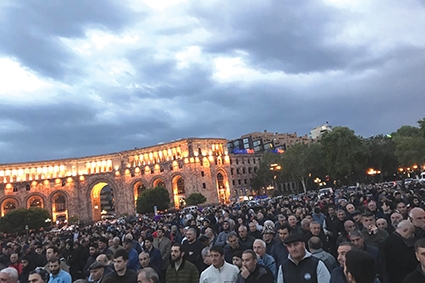Protests in Armenia Unlikely to Change the Country’s Foreign Policy
Op-Ed
Armenia experienced more than a week of protests against the former president Serzh Sargsyan’s transfer to the position of Prime Minister (PM). Since Armenia recently became a parliamentary republic, the new PM now holds greater powers and effectively controls the government.
Protesters demanded the new PM’s resignation and achieved this goal late Monday afternoon.
Unlike in many other neighboring countries, the situation inside Armenia is heavily influenced by external circumstances. Yerevan is strongly aligned with Russia, and Moscow deeply controls many of Armenia’s strategic infrastructures. Protests inside the country, if they get out of the government’s control, so endangering Moscow’s positions, could be easily manipulated by an escalation in Nagorno-Karabakh and the seven surrounding territories.
Armenia is dependent on Russia in the economic and energy sectors, but perhaps the most crucial point is the military aspect of this cooperation. Russia sells weaponry to Armenia, as it does to Azerbaijan. This results in discontent among the Armenian public and often brings the effectiveness of the alliance with Moscow into questioned. This was particularly true after the 2016 Nagorno-Karabakh military escalation, the worst since the end of the conflict in the early 1990s, when it became clear that Azerbaijan had achieved significant progress in its military capabilities.
Damping Russia as an ally would be very difficult for Armenia to do because the country is sandwiched between two of its enemies, Turkey and Azerbaijan. Without Russian military aid, together with diplomatic support, it will be difficult for Armenia to keep the existing status quo around the occupied territories. Baku will be less hesitant not to act, while Turkey will support its ally Azerbaijan, if not militarily then without doubt in every other way.
Thus, from a higher geopolitical standpoint, the Russian presence in Armenia, despite being criticized, is important for the security of the country, and each new Armenian government will take this into account. Hypothetically speaking, there will be only one scenario where Armenia will no longer need Russian assistance: if there is a change in the Nagorno-Karabakh status quo in favor of Azerbaijan and the withdrawal of Armenian forces from the occupied territories.
The geopolitics of Armenia goes hand-in-hand with the internal situation of the country. Previously, internal political crises inside and confrontations along the contact line in Nagorno-Karabakh were caused by each other.
Russia vs Revolutions
Although, for the moment, Russia has strong positions in Armenia, for the Kremlin the current Armenian protests are indirectly indicative that Russian influence can be subject to question. Demonstrations-turned-revolutions foundationally shook Russian influence in Georgia, Moldova and Ukraine. Those were revolutions which questioned the Russian right to dominate those countries; questioned Russian soft power and redirected those states towards Europe.
Still, the Russians would be right to fear the situation in Armenia, even if they do not express it in official comments. In fact, the protesters in Armenia have already named their activities an ongoing “Velvet Revolution”.
Historically, one of the foundations of Russian influence across the Eurasian landmass was the ability to position itself as a source of economic and political progress. Even the communism, with all its fundamental failures, was still a source of political attraction for many nations across the Eurasian landmass. The Russia-West geopolitical confrontation is multi-faceted, and which side will be more attractive politically is significant. In previous editions of GT, I have written extensively about how different the current Russia-West competition is from what happened in the past.
No matter how the standoff ended in Armenia, the country will constantly face internal problems as the Armenians increasingly regarding their Russian allies as a problem. At the same time, although the discontent will be growing, all will come down to the country’s geopolitical preferences: whether to keep the status quo around Nagorno-Karabakh and remain allied with Moscow, or to make concessions, as, without the Russian help, Yerevan will be unable to withstand the pressure from both Turkey and Azerbaijan simultaneously.
By Emil Avdaliani












